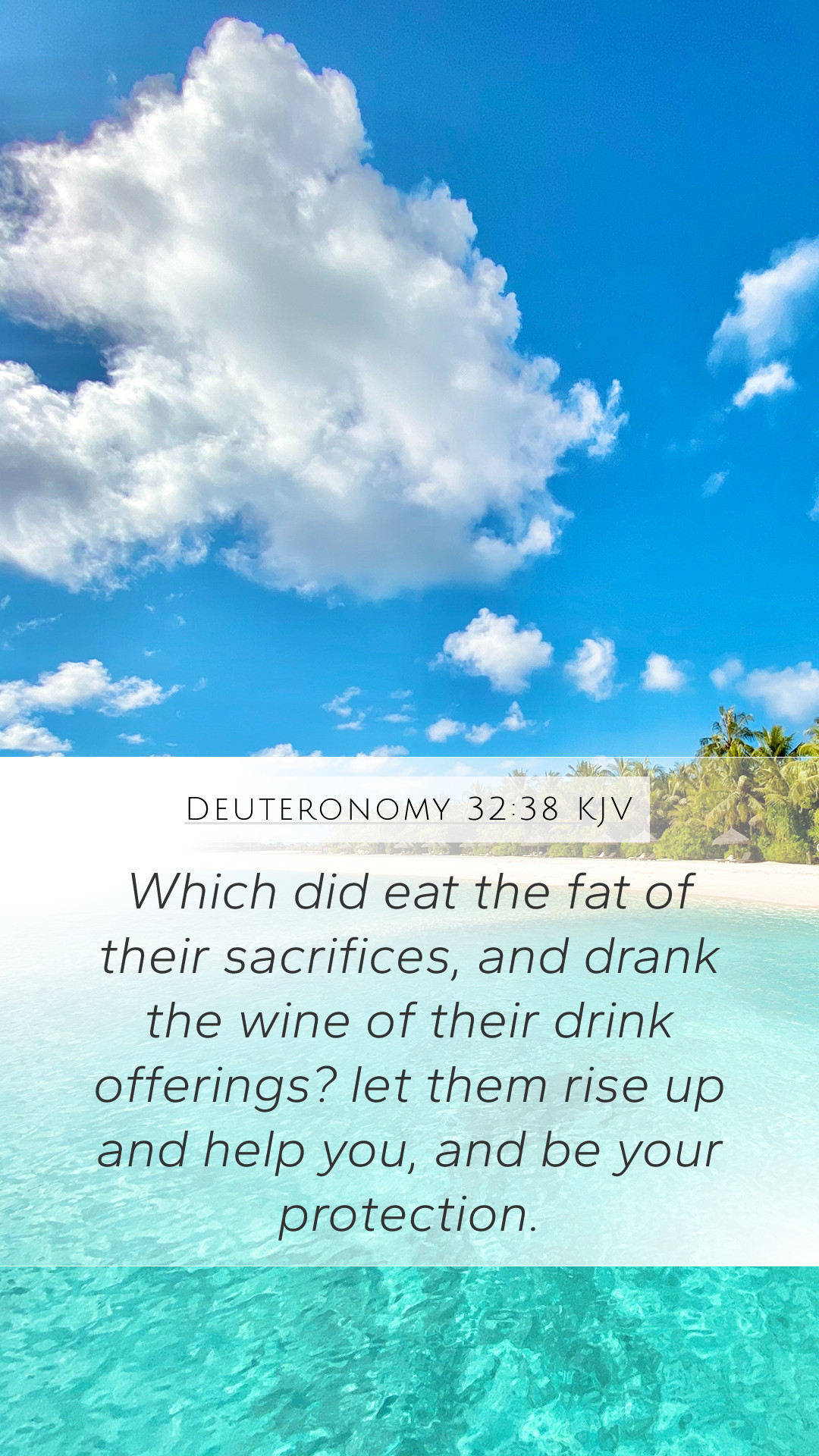Understanding Deuteronomy 32:38
Deuteronomy 32:38 states: "Which did eat the fat of their sacrifices, and drink the wine of their drink offerings? let them rise up and help you, and be your protection." This verse is packed with meaning and requires careful analysis to fully grasp its implications. In this commentary, we will explore the insights from public domain commentaries including Matthew Henry, Albert Barnes, and Adam Clarke.
Bible Verse Commentary: In Deuteronomy 32:38, the Lord is addressing the futility of relying on false gods who have not provided for His people. Through the imagery of eating fat and drinking wine, God contrasts the lavish offerings made to idols with His own providence and care. The verse serves as a reminder to the Israelites to put their trust in God alone, for He is the only true protector and provider.
Meaning of Bible Verses
This verse emphasizes the theme of divine sovereignty and the ineffectiveness of relying on false gods. Matthew Henry observes that the gods worshipped by the nations are depicted as powerless entities that cannot aid or protect their followers. This calls back to the core biblical principle of trusting in the one true God who graciously provides for His people.
Bible Verse Interpretations
- Matthew Henry: He emphasizes that the mention of sacrificing to false gods serves as a warning against idolatry. The failure of these gods to respond highlights their impotence.
- Albert Barnes: Barnes explains that God is essentially mocking the false gods. He challenges the people to consider whether their idols can truly assist them or deliver them from their troubles.
- Adam Clarke: Clarke points out that the context of this verse falls within the larger narrative of blessings and curses. He notes that when people turn away from God, they open themselves to destruction and desolation.
Scripture Analysis
The analysis of Deuteronomy 32:38 reveals its rich theological implications. It reinforces the understanding that God alone deserves worship and that reliance on anything else is misguided. As users of Bible study tools reflect on this verse, they are led to examine how their own lives may parallel the warnings found here.
Biblical Exegesis of Deuteronomy 32:38
The exegesis of this verse within its biblical context illustrates a transition from God's judgment on Israel's enemies to His insistence on loyalty among His people. When assessing the historical context, one must consider the Israelites’ struggles with idolatry and the allure of neighboring pagan cultures.
Applying Bible Verses to Daily Life
In practical application, believers are encouraged to reflect on what they place their trust in. This verse provokes questions about modern idols—be they material possessions, status, or relationships—that may distract from devotion to God.
Cross References
- Psalm 115:4-8: Discusses the idols made by human hands that cannot see or help.
- Isaiah 44:9-20: Illustrates the absurdity of idol-making and how they cannot save.
- Jeremiah 10:14: Emphasizes the folly of trusting in useless idols.
Conclusion
In reviewing Deuteronomy 32:38, we see its profound implications in the landscape of scripture. Through various interpretations and commentaries, the message remains clear: trust in the living God who sustains and protects His people, rather than the powerless idols of the world. For those engaging in Bible study groups or seeking online Bible study resources, this verse serves as a poignant reminder of God's unique role in our lives.
In summary, understanding this scripture encourages a deeper exploration of one's faith, and it invites believers to examine areas where they might be leaning on things other than God for support, leading to a richer spiritual life and a more committed relationship with the Lord.


